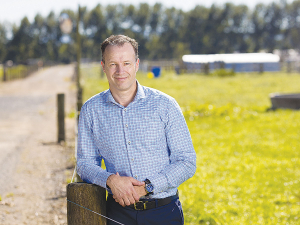DairyNZ Levy Vote Underway as Chair Highlights Seven-Fold Return
Voting has started for the renewal of DairyNZ's milksolids levy.
 DairyNZ outgoing chief executive Tim Mackle says on-farm inflation is one of the biggest concerns impacting profitability.
DairyNZ outgoing chief executive Tim Mackle says on-farm inflation is one of the biggest concerns impacting profitability.
Farm costs have risen 33% over the past years to top on average $9.17/kgMS last season, according to DairyNZ.
Data also shows that, on average, farm costs increased by around 13% between the past two seasons (2021/22 and 2022/23).
However, costs are forecast to reduce from around $9.17/kgMS last season to around $8.96/kgMS for the new season that started June 1.
DairyNZ chief executive Tim Mackle says it is good to be seeing a slight reduction in farm expenses, particularly for urea and supplementary feed, but costs are still high.
"We are hearing from farmers that on-farm inflation is one of the biggest concerns impacting their profitability, as they have experienced significant price increases in the past year," says Mackle.
DairyNZ has launched an online tool - DairyNZ Econ - to help farmers better understand the current economic environment.
Mackle says farmers are focused on managing rising costs at the start of the new dairy season.
"Every farm is different but, given the scale of cost increases in the past few seasons, many farms will be feeling the current profit squeeze.
"They will likely be starting the season with inflation, farm costs and milk prices front of mind, and considering how to approach the year ahead.
"That's why we are focused on supporting our farmers through current market conditions. We are excited to launch our new DairyNZ Econ Tracker to farmers, which provides some of the latest information on the New Zealand dairy sector, including farm economics.
"This is a central platform where farmers can gain information to help understand their operating environment, track sector trends, and then apply the information to their individual farm businesses."
The DairyNZ Econ Tracker builds on the availabel information from the DairyNZ Economic Survey and Dairy Statistics and provides a snapshot of the dairy sector's economic situation.
Information will include forecasts applying regional and national average data, providing useful trends to observe for farmers to consider the application to their individual farms.
"Farmers can use this data to help look for trends and understand the current economic environment, including what is happening now and what may happen in the near future, to support their budgeting and farm business planning."
Context and information provided from the Econ Tracker will help farmers prepare for different scenarios in the seasons ahead. DairyNZ has also been working with farmers to understand what they are doing to farm through the current economic environment.
Farmers' top tips include surrounding yourself with people who understand farming and its outlook, having a strong support team and ensuring young stock have the best possible start.
These tips and more are available on DairyNZ's website.
The new DairyNZ Econ Tracker is available online at dairynz.co.nz/econtracker.
The Government's chief science advisor, Dr John Roche says the key objective for the science sector in the coming year is bedding down the reforms which sees the merger of the previous entities.
Hawke's Bay apple grower Taylor Corporation says a standout 2026 season, coming after a few difficult years, is boosting optimism among growers.
Horticulture New Zealand (HortNZ) has added its perspective to numerous primary sector voices urging the Government to strengthen its draft legislation to replace the Resource Management Act (RMA).
The Commerce Commission has finalised new information disclosure requirements for local councils and water organisations that deliver water supply and wastewater services.
Beef + Lamb NZ (B+LNZ) is calling for significant changes to the Government’s reforms to the Resource Management Act (RMA).
NZPork says the Government needs to strengthen its proposed planning laws to ensure New Zealand's pig farmers can continue to produce pork.